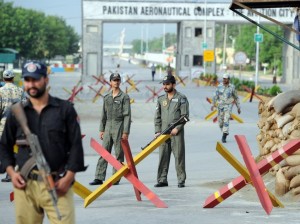Terrorism has taken a center stage as Pakistan prepares for elections. The country has seen a steep rise in terrorist incidents at a time when elections are just around the corner.
As the security forces are battling against the militants in the tribal areas, a new bout of attacks against the Shia community has surfaced in Balochistan and Karachi. The country has witnessed some of the deadliest attacks in its history against the Shia community.
On January 10, a suicide bomber detonated himself and, minutes later, another bomb ripped through a snooker club on the Alamdar road of Quetta killing around a hundred people.
Weeks later, on February 16, a water tanker laden with 1000 kg of explosives ripped through a busy market in Quetta’s Hazara town killing over a hundred people of the Shia Hazara community.
As the country was reeling under sectarian strife, a deadly blast ripped through the residential apartments of Karachi’s Abbas Town, a residential estate of the Shia community killing scores of people.
The sudden rise in sectarian attacks has raised many eyebrows as political commentators fear the deteriorating situation of law and order might delay the polls. It will be difficult for the common voter to turn up on polling day, and the mounting violence has widened the trust deficit between the citizens and their elected representatives.
Seasoned journalist and political commentator Najam Sethi blames a lack of political will for the mounting violence. “The government lacks the courage to curb militancy, as they have their own petty interests which they don’t want to put at stake,” he said in a TV interview. He said he sees ‘much more than the polls’ as being at stake in face of the escalating violence. “The government is giving space for the third power to step in,” he added.
The political leadership however blames ‘anti democratic forces’ for the increasing violence and alleges that some forces want to derail democracy. Former prime minister and chief of his own faction of the Pakistan Muslim League (PML-N), Nawaz Shareef, has said certain forces were conspiring to delay the elections, Dawn.com reported.
Federal Minister for Information and Broadcasting said he also believes that behind the violence is an effort to delay the elections, according reporting from TheNews.com.
Analyst Ayesha Siddiqa said she concurs with the political leadership on reasons for the increase in terrorist incidents. “At a minimum, they’re trying to unnerve the politicians; at worst, it could be an attempt to destabilise the system so that there’s a takeover or a change of a different kind could be justified,” she told TheAustralian.com.
As the country inches towards elections and election campaigning gains momentum, so does the intensity and frequency of attacks. Uncertainty looms large as Pakistan awaits a democratic transition of power for the first time in the country’s troubled history of military interventions.



Comments